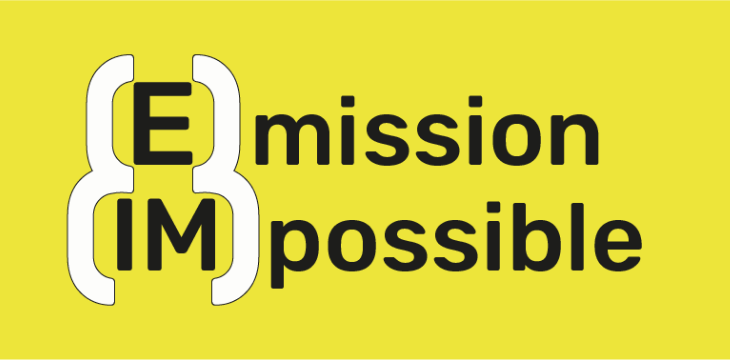
(e)mission (im)possible
Climate action mainstreaming in development cooperation and humanitarian aid
THE CONTEXT
The current climate emergency requires immediate and drastic action. The IPCC 1.5°C Special Report clearly states that global climate neutrality has to be reached by 2050 to avoid irreversible effects and that a collective effort from all sectors of economy and society is needed.
Many initiatives are targeting economic profit sectors, much is still to be done to improve development cooperation and humanitarian organisations’ climate footprint and enhance their contribution in promoting climate action all over the world.
The role that NGDOs have in promoting climate actions’ mainstreaming at organisational level, community level and institutional level has a great potential that (e)mission (im)possible wishes to build up.
OBJECTIVES
(e)mission (im)possible aims at developing Higher Education qualifications in the field of climate action among development cooperation and humanitarian’s future and current professionals in order to boost NGDOs’ climate leadership.
For this purpose, (e)mission (im)possible aims to:
Enhance the ability of Higher Education Institutions (HEI), NGDOs and climate organisations to train and further develop qualifications on climate action
Build key climate competences enabling NGDOs professionals to become true agents of change through climate action.
THE PROJECT
The (e)mission (im)possible consortium is composed of 6 development cooperation, humanitarian and climate organisations and 1 university from Italy, Spain and Portugal who joined forces to advance NGDOs contribution to climate action.
The project actions will combine the development of various types of learning opportunities directed both to a large audience of development cooperation and humanitarian aid (DC&H) professionals and to the partners’ staff.
A MOOC will facilitate the access of DC&H professionals to flexible training opportunities to build key climate action competences. Based on co-created and work-based learning contents, the MOOC is tailored to the actual needs and competence gaps of DC&H professionals in this sector.
(e)mission (im)possible is also developing an “on the job” learning pathway dedicated to climate action competences so that professionals can become climate action strategists within their organisation.
Finally, the project contributes to fostering the cooperation between HEIs, NGDOs, environmental and climate experts in mainstreaming climate neutrality qualifications in higher education while promoting the replication and dissemination of its upskill intents.
ACTIVITIES
(e)mission (im)possible foreseen the following key activities:
- MOOC (Massive On-Line Open Course)
The MOOC, available in 5 different languages (English, Italian, Portuguese, Spanish and French), consists of 6 hours of video lectures and additional reading on climate action’s key topics for a total learning path of 25 hours that will help future and current professionals to review the scientific, environmental, political, economical and human dimensions of climate change and to understand what international aid organisations can do to reduce their carbon footprint and to boast their positive effects on climate change mitigation and adaptation. - Climate neutrality training scheme
The project foresees the production of a climate action strategy Toolkit and a Training scheme for the development “on the job” of NGDOs staff’s competencies in climate action. The toolkit will include a climate impact calculation tool and a handbook on transformative climate action strategy. - Methodological framework for implementation
The methodological framework for implementation will provide detailed methodological insights for the development of climate neutrality competencies among DC&H professionals and NGDOs outside the partnership.
It will provide key tools and advice for the replication of (e)mission (im)possible learning scheme and its dissemination among NDGOs, DC&H institution representatives and HEI academics. - Webinars
4 webinars will be organised to support networking and to promote replicability of (e)mission (im)possible among DC&H professionals, students and academics. - Multiplier Events
Between 2022 and 2024, 6 events are foreseen in Madrid, Rome, Lisbon, Cadiz and Bruxelles to disseminate, share the project's results and activities and reinforce networking between non profit organisations, universities and institutions engaged in climate actions in development cooperation and humanitarian aid.
BENEFICIARIES
Learning opportunities are open to future and current professionals from the Development Cooperation and Humanitarian Aid sector: students, volunteers, unemployed or not yet employed professionals, NGDOs staff, academics and teachers, ect.
Networking, dissemination and exploitation activities will also target local, national and European institutions, Higher Education Institutions, climate and environmental organisations and grassroots.
With regard to geographical reach, (e)mission (im)possible activities will engage and reach participants and stakeholders not only in Italy, Spain and Portugal and other European countries but also other regions of the world: Africa (Mozambique, Togo, Guinea-Bissau), Latin America (Venezuela, Bolivia, Colombia, Ecuador) and Middle-East.

Name: (e)mission (im)possible
Project Sector: Activism and Civil Society
Beneficiaries: Students, volunteers, unemployed or not yet employed professionals, NGDOs staff, academics and teachers, local, national and European institutions, Higher Education Institutions, climate and environmental organisations and grassroots
Total duration: January 2022 - August 2025
Project Areas: Italy, Spain, Portugal, Mozambique, Togo, Guinea-Bissau, Venezuela, Bolivia, Colombia, Ecuador and Middle-East
Partners: A Sud, Fondazione Ecosistemi, AIDGLOBAL, Iroko, Bosque y Comunidad, Universidad de Cadiz
Donor: Co-funded by the Erasmus + programme of the European Union
